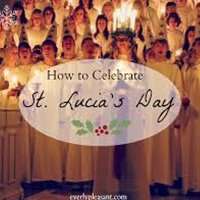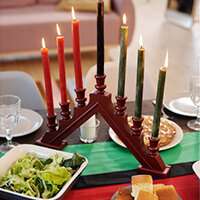Did you know that the shortest days of the year occur during December?
Most of us don’t even notice amid all of the holiday cheer. December is jam-packed with celebrations — perhaps humankind’s way of bringing light into the darkest month of the year. To keep track of all December’s holidays, we made a list of some of the most popular ones so you can learn a little bit about each of them. Jump to the holiday you want to explore by clicking on one of the links above!
No matter what you celebrate, we hope you have a happy holiday season!
Hanukkah – This year, the Festival of Lights began on Sunday, November 28, although that date changes each year. It continues for 8 nights. Hanukkah (also spelled Chanukah) celebrates 2 miracles: the rededication of the Temple in Jerusalem after an unexpected victory by Judah Maccabee, and a celebratory menorah that stayed lit for 8 days even though it only had enough oil for 1. Celebrate with a menorah, foods made with oil like latkes, family, gifts, gelt, and maybe even a Dreidel. Learn more here.
St. Lucy’s Day – Celebrated this year on December 13th, this holiday marks the beginning of the Christmas season in many Scandinavian countries. Saint Lucy (Lucy meaning “light”) is the patron saint of the blind from Syracuse, Italy. The holiday itself formed “to bring hope and light during the darkest time of the year” (Britannica). Families in Scandanavia celebrate by having their eldest daughter dress in a white robe, wear an evergreen wreath with candles on her head, and serve traditional foods like ginger biscuits and saffron bread to other members of the family. Learn more here.
Yule – Marking the Winter Solstice, Yule is on December 21st, 2021, and is celebrated for 12 days (hence the song “The Twelve Days of Christmas”). Also known as Yuletide, Yule is one of the oldest December celebrations in the world and began as “…a celebration of the reappearance of the Sun and the fertile land’s rebirth” (The Old Farmer’s Almanac). One way to celebrate is burning a yule log or with yule log-themed desserts, a yule alter or an evergreen wreath. Learn more here.
Christmas – Always celebrated on December 25th, Christmas marks the anniversary of the birth of Jesus, a spiritual leader whose teachings form the basis of Christianity. December 25th became a federal holiday in the U.S. in 1870. Decorate an evergreen (or a plastic evergreen) tree with ornaments, and sometime in the wee hours of Christmas morning, presents will appear underneath! Christmas is a day to spread love – you could volunteer, give gifts, cook dinner, or send cards to people in your community. Learn more here.
Boxing Day – Celebrated the day after Christmas, December 26th, this date is a public holiday in the UK and some British Commonwealth countries. Boxing Day originated in Britain and while the exact origins are unknown, most theories associate it with charitable giving — not leftover present boxes or boxing the sport. According to National Today, Boxing Day is known for “it’s fantastic deals, discounts, and sales,” kind of like Black Friday in the U.S. Learn more here.
Kwanzaa – Celebrated fromDecember 26th to January 1st, Kwanzaa was created in 1966 by Dr. Maulana Kareng, professor and chairman of Black Studies at California State University, as a way to promote community among African Americans after the LA Watts Rebellion in 1965. On each of the 7 nights, a candle on the Kinara (candleholder) is lit, and one of the holiday’s seven principles is discussed. Each principle represents values of African culture — click here to learn more about them. Learn more here.








